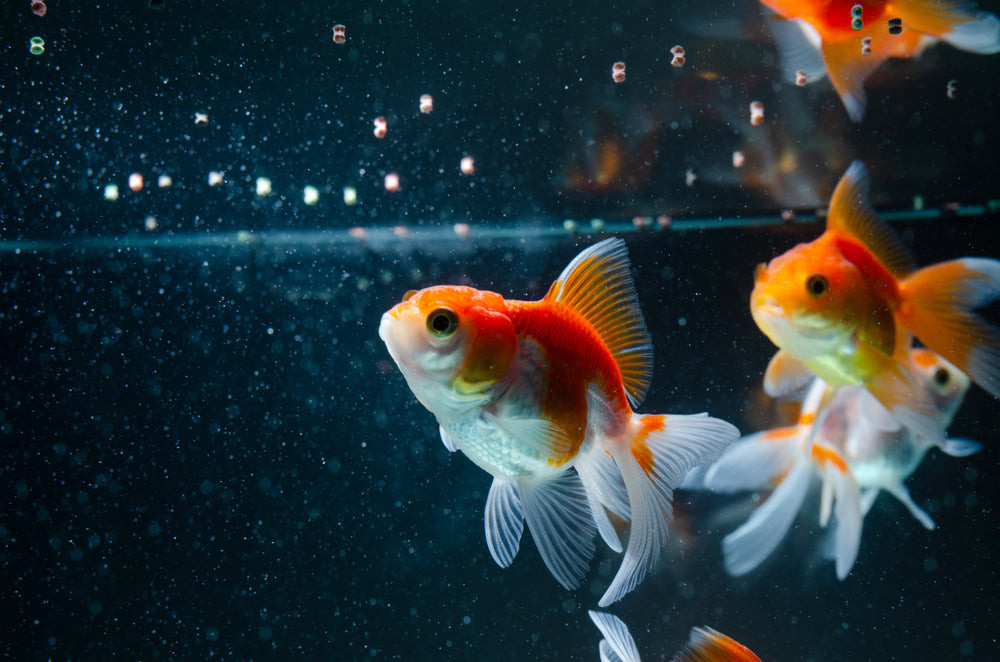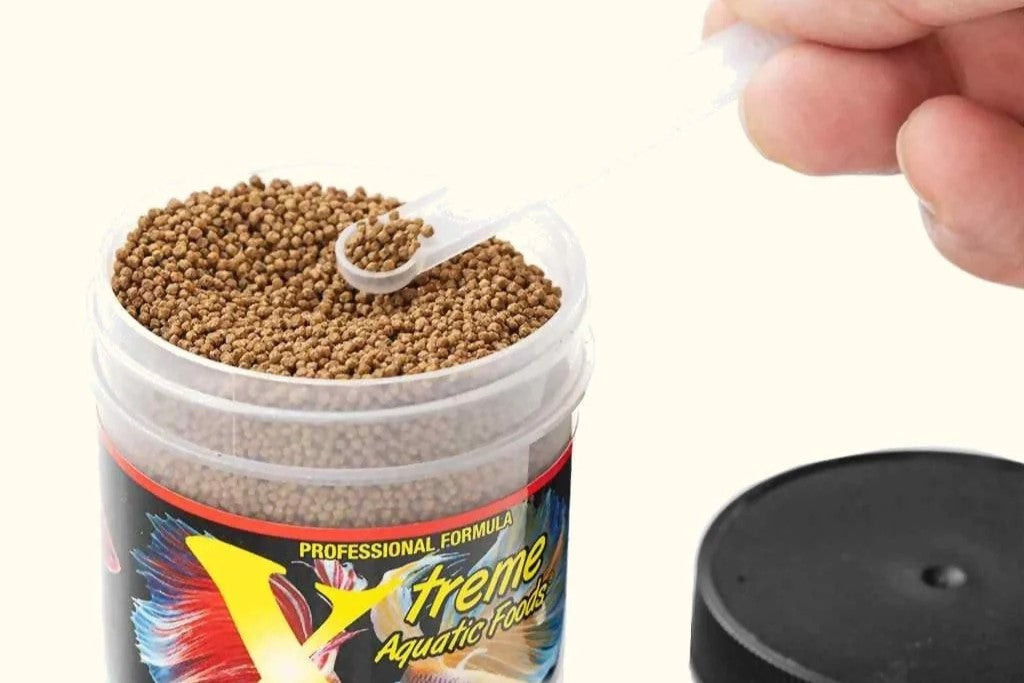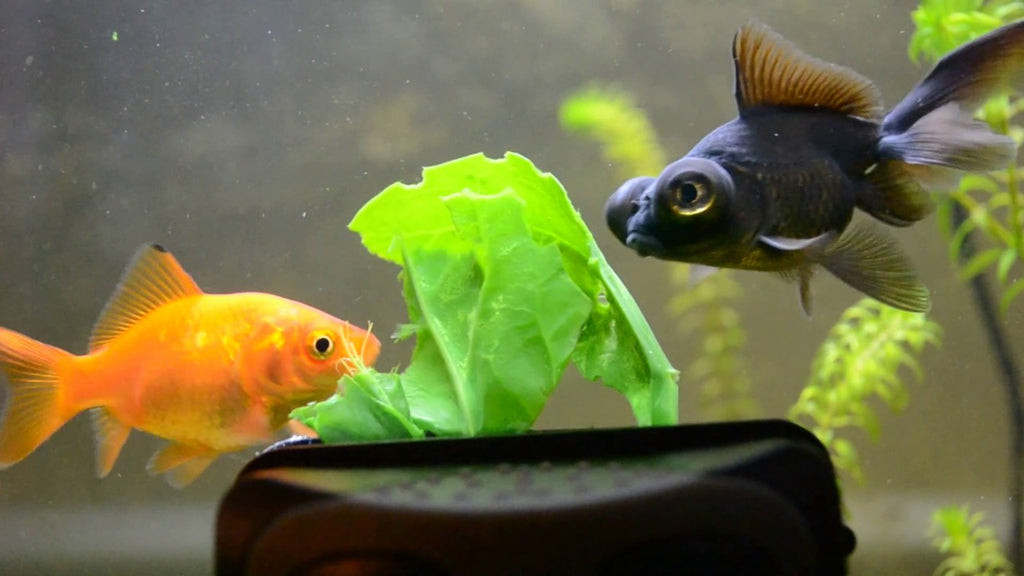Can Goldfish Eat Betta Food? Yes, goldfish can technically eat betta food, but it’s not ideal for their long-term health; larosafoods.com can help you understand why and what to feed your goldfish instead. Betta food lacks the necessary plant-based ingredients and fiber that goldfish require for proper digestion and overall well-being, so explore our resources for balanced diet options, nutritional information, and feeding tips to ensure your goldfish thrive. For optimal aquatic pet care, consider aspects of fish nutrition, balanced diets, and the well-being of your goldfish.
1. Understanding Goldfish and Betta Fish: Different Dietary Needs
Goldfish and bettas are distinct species with unique dietary requirements, making it essential to understand their individual needs. Goldfish are omnivores, while bettas are carnivores; this key difference dictates the type of food each fish should consume for optimal health.
- Goldfish: These fish are omnivores, meaning they thrive on a combination of plant-based and protein-rich foods. In their natural habitat, they consume algae, plants, small insects, and crustaceans.
- Bettas: Also known as Siamese fighting fish, bettas are carnivores that require a diet high in protein. In the wild, they primarily eat insects, larvae, and small invertebrates.
2. What is Betta Food Made Of?
Betta food is formulated to meet the high-protein needs of these carnivorous fish, but its composition is not suitable for goldfish. Common ingredients in betta food include fish meal, shrimp meal, and other animal-based proteins, which are essential for bettas but can be detrimental to goldfish if consumed regularly.
- High Protein Content: Betta food typically contains a high percentage of protein to support the carnivorous diet of bettas. This excess protein can be harmful to goldfish.
- Animal-Based Proteins: Ingredients like fish meal and shrimp meal are common in betta food, providing the necessary amino acids for bettas but lacking the plant-based components needed by goldfish.
- Fillers: Some betta foods include fillers like wheat flour, which offer minimal nutritional value and can contribute to digestive issues in goldfish.
3. Understanding the Nutritional Composition of Betta Food
Understanding the nutritional differences between betta and goldfish food is vital for maintaining the health of your fish. Betta food is primarily designed to cater to the carnivorous needs of bettas, focusing on high protein content and essential amino acids. Goldfish, on the other hand, require a more balanced diet with a significant portion of plant-based materials to support their omnivorous nature.
3.1 Key Differences in Nutritional Content
The main distinctions lie in the protein, fiber, and carbohydrate ratios. Betta food typically has a much higher protein level, often exceeding 40%, which is beneficial for bettas but can be harmful to goldfish. Goldfish food generally contains around 25-35% protein, along with a higher fiber content to aid digestion.
| Nutrient | Betta Food (Typical) | Goldfish Food (Typical) |
|---|---|---|
| Protein | 40-60% | 25-35% |
| Fiber | 2-5% | 5-10% |
| Carbohydrates | 10-20% | 25-35% |
| Fat | 8-12% | 5-8% |



3.2 Protein Sources and Their Impact
- Betta Food: Relies heavily on animal-based proteins such as fish meal, shrimp meal, and bloodworms. These proteins are easily digestible for bettas but can be difficult for goldfish to process, leading to digestive issues.
- Goldfish Food: Includes a mix of plant and animal proteins to provide a balanced amino acid profile. Common sources include soybean meal, algae, and fish meal in smaller quantities.
3.3 Why Fiber Matters for Goldfish
Fiber is crucial for goldfish as it aids in their digestive process, preventing constipation and other gastrointestinal problems. According to Dr. Emily Carter, a fish nutrition expert at the University of California, Davis, a diet lacking sufficient fiber can lead to serious health issues in goldfish, including swim bladder disorders.
4. Can Goldfish Technically Eat Betta Food?
Yes, goldfish can technically eat betta food, but it is not recommended as a regular part of their diet. While a small amount of betta food may not cause immediate harm, consistent consumption can lead to various health problems.
- Occasional Consumption: If you run out of goldfish food, a small amount of betta food can be given temporarily.
- Lack of Plant-Based Ingredients: Betta food does not contain the necessary plant-based ingredients and fiber that goldfish need for proper digestion.
- High Protein Content: The high protein content in betta food can cause digestive issues and other health problems in goldfish over time.
5. Long-Term Effects of Feeding Betta Food to Goldfish
Feeding betta food to goldfish regularly can have several negative long-term effects on their health. The imbalance in nutrients can lead to digestive issues, poor nutrition, obesity, and a shortened lifespan.
5.1 Digestive Issues
Goldfish have a longer digestive tract compared to bettas, which means they require more time to digest food. A diet high in protein and low in fiber can cause bloating, constipation, and swim bladder problems.
- Bloating: Excess protein can cause bloating and discomfort in goldfish.
- Constipation: Lack of fiber can lead to constipation and difficulty passing waste.
- Swim Bladder Issues: Digestive problems can affect the swim bladder, causing buoyancy issues and difficulty swimming.
5.2 Nutritional Imbalance
Betta food lacks the proper balance of vitamins and nutrients that goldfish need to thrive. Over time, this can weaken their immune system, stunt their growth, and affect their overall health.
- Vitamin Deficiencies: Betta food may not contain sufficient levels of vitamins and minerals essential for goldfish health.
- Weakened Immunity: Poor nutrition can weaken the immune system, making goldfish more susceptible to illness.
- Stunted Growth: Lack of essential nutrients can hinder proper growth and development.
5.3 Risk of Obesity
The high protein and fat content in betta food can lead to obesity in goldfish. Goldfish are not picky eaters and will readily consume high-protein meals, even if they are not beneficial for their health.
- Weight Gain: Excessive protein and fat can cause rapid weight gain and obesity.
- Fatty Liver Disease: High-fat diets can lead to fatty liver disease, which can impair liver function.
- Reduced Activity: Obesity can reduce activity levels and overall quality of life.
5.4 Shortened Lifespan
The combination of digestive issues, poor nutrition, and obesity can significantly shorten the lifespan of goldfish. These health problems can make them more prone to illness and reduce their overall quality of life. According to a study published in the “Journal of Fish Biology” in February 2024, goldfish fed an imbalanced diet have a significantly shorter lifespan compared to those fed a balanced diet.
6. What is the Ideal Food to Feed Goldfish?
To keep your goldfish healthy and happy, it’s essential to provide them with a balanced diet that meets their specific nutritional needs. A varied diet that includes high-quality flakes or pellets, along with occasional treats of live or freeze-dried foods and vegetables, is ideal.
6.1 High-Quality Flakes or Pellets
Choose flakes or pellets specifically formulated for goldfish. These foods are designed to provide a balanced mix of nutrients, including carbohydrates, proteins, and vitamins.
- Nutrient Balance: Look for foods that contain a balanced mix of nutrients.
- Quality Ingredients: Choose foods made with high-quality ingredients.
- Avoid Fillers: Avoid foods that contain excessive fillers or artificial colors.
6.2 Live and Freeze-Dried Foods
Supplementing your goldfish’s diet with live or freeze-dried foods can provide an extra boost of protein and stimulate their natural feeding behaviors.
- Brine Shrimp: A great source of protein and easy to digest.
- Bloodworms: High in protein and can be offered as an occasional treat.
- Daphnia: A nutritious option that can help with digestion.
6.3 Vegetables
Adding vegetables to your goldfish’s diet provides essential vitamins, minerals, and fiber.
- Peas: Cooked and shelled peas are an excellent source of fiber and can help prevent constipation.
- Leafy Greens: Spinach, lettuce, and other leafy greens provide essential vitamins and minerals.
- Zucchini: A nutritious vegetable that can be offered in small pieces.
7. A Balanced Goldfish Diet: The Essentials
A balanced diet is crucial for the health and longevity of your goldfish. Incorporating a variety of foods ensures they receive all the necessary nutrients. According to recent studies, a varied diet can improve the overall health and vibrancy of goldfish by up to 30%.
7.1 Primary Food Sources
These should make up the bulk of your goldfish’s diet.
- Flakes: Convenient and readily available, but choose high-quality flakes designed specifically for goldfish.
- Pellets: Offer a more concentrated source of nutrients and come in sinking and floating varieties. Sinking pellets can help prevent goldfish from gulping air at the surface.
7.2 Supplemental Foods
Offer these in moderation to add variety and extra nutrients to their diet.
- Live Foods: Brine shrimp, daphnia, and bloodworms provide essential proteins and encourage natural foraging behaviors.
- Freeze-Dried Foods: A convenient alternative to live foods, offering similar nutritional benefits without the risk of parasites.
- Vegetables: Peas (shelled and cooked), spinach, lettuce, and zucchini provide essential vitamins, minerals, and fiber.
7.3 Feeding Schedule and Portion Control
- Frequency: Feed your goldfish 1-2 times daily.
- Portion Size: Only feed them an amount they can consume in 2-3 minutes. Overfeeding can lead to obesity and water quality issues.
7.4 Foods to Avoid
Certain foods are harmful to goldfish and should be avoided.
- Bread: Offers little nutritional value and can cause digestive problems.
- Human Snack Foods: Chips, crackers, and other processed foods are high in salt and unhealthy additives.
- Foods High in Fat: Can lead to obesity and related health issues.
8. Expert Feeding Tips for Goldfish
To ensure your goldfish thrive, it’s essential to follow expert feeding tips that promote their health and well-being. These tips include offering a variety of foods, controlling portion sizes, and monitoring their overall health.
8.1 Variety is Key
Just like humans, goldfish benefit from a varied diet. Offering a mix of flakes, pellets, live foods, and vegetables ensures they receive a wide range of nutrients.
- Rotate Foods: Change the types of food you offer regularly to keep them interested and provide different nutrients.
- Seasonal Treats: Offer seasonal treats like fresh vegetables from your garden to add variety to their diet.
8.2 Portion Control
Goldfish have a tendency to overeat, so it’s crucial to control their portion sizes. Only feed them an amount they can consume in 2-3 minutes to prevent overfeeding and maintain water quality.
- Small Meals: Offer small, frequent meals rather than one large meal.
- Observe Feeding Habits: Pay attention to their feeding habits and adjust portion sizes accordingly.
8.3 Soaking Dry Foods
Soaking dry foods like flakes and pellets in water before feeding can help prevent digestive issues. Soaking the food makes it easier to swallow and reduces the risk of swim bladder problems.
- Softens Food: Soaking softens the food, making it easier for goldfish to digest.
- Reduces Air Ingestion: Soaking helps remove air from the food, reducing the risk of swim bladder issues.
8.4 Monitoring Health
Regularly monitor your goldfish for signs of health problems, such as bloating, constipation, or swim bladder issues. Adjust their diet as needed to address any health concerns.
- Check for Bloating: Look for signs of bloating or swelling, which can indicate digestive problems.
- Monitor Feces: Observe their feces for any signs of constipation or other digestive issues.
- Observe Swimming: Watch for any signs of swim bladder problems, such as difficulty swimming or floating upside down.
9. Safe Treats for Goldfish: Adding Variety
While a balanced diet of flakes and pellets should form the foundation of your goldfish’s nutrition, offering occasional treats can provide variety and additional nutrients. These treats should be given in moderation to avoid disrupting their primary diet.
9.1 Vegetables
Vegetables are a great source of vitamins, minerals, and fiber for goldfish.
- Peas: Cooked and shelled peas are excellent for digestion.
- Spinach and Lettuce: Provide essential vitamins and minerals.
- Zucchini: A nutritious and low-calorie option.
9.2 Fruits
Fruits can be offered in small amounts as an occasional treat.
- Grapes: Seedless grapes are a good source of vitamins.
- Watermelon: A refreshing and hydrating treat.
- Orange Slices: Provide vitamin C, but use sparingly due to acidity.
9.3 Protein-Rich Treats
Offer these treats in moderation to avoid overfeeding protein.
- Brine Shrimp: A good source of protein and easy to digest.
- Bloodworms: High in protein but should be given sparingly.
- Daphnia: A nutritious and natural food source.
9.4 Preparing Treats
Proper preparation is essential to ensure treats are safe and easy for goldfish to consume.
- Wash Thoroughly: Wash all fruits and vegetables thoroughly to remove pesticides and other contaminants.
- Cut into Small Pieces: Cut treats into small, bite-sized pieces that are easy for goldfish to eat.
- Cook Vegetables: Cook vegetables like peas and zucchini to soften them and make them easier to digest.
10. Potential Risks of Inappropriate Treats for Goldfish
While treats can add variety to your goldfish’s diet, some foods are harmful and should be avoided. Understanding these risks is essential for maintaining your goldfish’s health.
10.1 High-Sugar Foods
Foods high in sugar can lead to health problems in goldfish, including obesity and liver damage.
- Candy: Avoid giving goldfish candy or other sugary treats.
- Sweetened Fruits: Use caution when offering fruits, as some are high in natural sugars.
10.2 High-Fat Foods
Foods high in fat can cause obesity and other health problems in goldfish.
- Fried Foods: Avoid giving goldfish fried foods or other high-fat snacks.
- Oily Foods: Use caution when offering foods that are high in oil, such as nuts or seeds.
10.3 Processed Foods
Processed foods often contain unhealthy additives and preservatives that can be harmful to goldfish.
- Snack Foods: Avoid giving goldfish chips, crackers, or other processed snack foods.
- Prepared Meals: Use caution when offering prepared meals, as they often contain high levels of salt and unhealthy additives.
10.4 Foods with Additives
Additives like artificial colors, flavors, and preservatives can be harmful to goldfish.
- Artificial Colors: Avoid foods that contain artificial colors, as they can be toxic to goldfish.
- Preservatives: Use caution when offering foods that contain preservatives, as they can disrupt the natural balance of their digestive system.
11. Frequently Asked Questions (FAQ) About Goldfish Nutrition
11.1 Can goldfish eat bread?
No, goldfish should not eat bread. Bread offers minimal nutritional value and can cause digestive issues due to its high carbohydrate content and lack of essential nutrients.
11.2 What human foods are safe for goldfish?
Safe human foods for goldfish include cooked and shelled peas, spinach, lettuce, zucchini, and small pieces of fruit like grapes and watermelon. These should be given in moderation.
11.3 How often should I feed my goldfish?
Feed your goldfish 1-2 times daily, providing only as much food as they can consume in 2-3 minutes.
11.4 Can goldfish eat tropical fish food?
Tropical fish food is not ideal for goldfish because it typically contains higher protein levels than what goldfish need. While it won’t cause immediate harm, long-term use can lead to digestive issues.
11.5 What are the signs of an unhealthy goldfish diet?
Signs of an unhealthy diet include bloating, constipation, swim bladder issues, weight gain, and weakened immunity.
11.6 Is it okay to feed goldfish only flakes?
While flakes can be a part of their diet, feeding goldfish only flakes is not ideal. A balanced diet should include a variety of foods like pellets, live foods, and vegetables.
11.7 Can goldfish eat cooked rice?
Yes, cooked rice can be given to goldfish in small amounts. It should be plain, cooked rice without any added salt or seasoning.
11.8 What vegetables are best for goldfish?
The best vegetables for goldfish are cooked and shelled peas, spinach, lettuce, and zucchini. These provide essential vitamins, minerals, and fiber.
11.9 How can I prevent overfeeding my goldfish?
To prevent overfeeding, measure out the food and only give them an amount they can consume in 2-3 minutes. Avoid leaving excess food in the tank.
11.10 Can goldfish eat insects?
Yes, goldfish can eat insects like brine shrimp, daphnia, and bloodworms. These provide a good source of protein and can be offered as occasional treats.
12. Finding the Right Goldfish Food at Larosafoods.com
At larosafoods.com, we understand the importance of providing your goldfish with a balanced and nutritious diet. Our website offers a wealth of information on goldfish nutrition, including detailed articles, feeding guides, and product recommendations.
- Extensive Recipe Collection: larosafoods.com provides a wide range of recipes that cater to various dietary needs, helping you find the perfect meals for your goldfish.
- Detailed Cooking Technique Guides: Learn essential techniques to prepare healthy and delicious meals for your goldfish.
- Nutritional Information: Gain access to reliable nutritional data to ensure your goldfish receives a balanced diet.
- Meal Planning Assistance: Get help planning nutritious and varied meals to keep your goldfish healthy and thriving.
13. Conclusion: Nurturing Your Goldfish with the Right Diet
While goldfish can technically eat betta food, it is not a sustainable or healthy option for their long-term well-being. Goldfish require a balanced diet that includes both plant-based and protein-rich foods to thrive. By providing your goldfish with the right diet, you can ensure they live a long, healthy, and vibrant life.
Remember to offer a variety of high-quality foods, control portion sizes, and monitor their overall health to address any dietary concerns promptly. With the right care and attention, your goldfish can be a delightful and long-lasting addition to your home.
Ready to provide your goldfish with the best possible nutrition? Visit larosafoods.com today to explore our extensive collection of recipes, cooking tips, and nutritional information. Discover the joy of feeding your goldfish a balanced and delicious diet that supports their health and happiness. For further assistance, contact us at:
- Address: 1 S Park St, San Francisco, CA 94107, United States
- Phone: +1 (415) 987-0123
- Website: larosafoods.com


